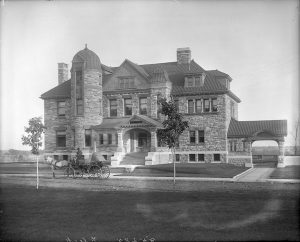1848 – 1924
Born in Montreal, the son of a foundry owner, a modest and unassuming man, Andrew Walker Fleck was a businessman and philanthropist who worked in the lumber and transportation business for J.R. Booth.

The house[1] at the east end of Wilbrod St. (No. 500) was built by J.R. Booth for his eldest daughter Helen Gertrude and her husband, Andrew Fleck, who managed some of Booth’s mills and was Secretary-Treasurer to his Canada Atlantic Railway for twenty years. They needed a new house after having lost theirs in the large 1900 Ottawa fire. Designed by J.W.H. Watts in 1900-02, it is one of the last grand mansions built in Sandy Hill. The original property was originally much larger, including land both to the east and west where condos now stand.
Watts also designed the Fleck’s magnificent summer house Men-Wah-Tay (meaning Place of Sunshine) at Rock Lake[2] in what is now Algonquin Park. The Flecks would travel to Men-Wah-Tay in their private railway car, the ‘Opeongo’ that they parked on a private railroad siding. Gertrude Fleck loved that railway car and, it is said, designed the dining room of her Ottawa home, including the arched ceiling, to match that of the railway car.
Fleck retired in 1904, when Booth sold the railway, to dedicate himself to philanthropic causes, such as the Carleton County Protestant General Hospital, the Red Cross and, most of all, St John’s Ambulance. The building housing the Andrew Fleck Child Care Services on George Street was donated by his wife after his death.
Fleck lived here until he died in 1924 and his wife until 1940. Senator Paterson subsequently occupied the house until 1983. Carleton University’s Norman Paterson School of International Affairs is named after him. In the 1990s, the house became the headquarters of the Natural Law Party of Canada and is now home to the Algerian embassy. This is one of the few buildings in Ottawa part of whose interior is protected under the Ontario Heritage Act.
[1] One of Booth’s sons lived just around the corner on Charlotte St. in an equally-grand mansion, now disappeared. It is the site of the Russian embassy. See page 56.
[2] Booth had originally owned the logging rights to the land around Rock Lake. When he surrendered these rights, he kept a smaller portion as private property.
